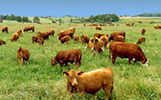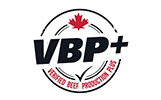| Five–Year Strategic Plan Approved by GRSB in Chicago 
The Cattle Site | June 20, 2016
A five–year strategic plan was approved by a unanimous vote from the Global Roundtable for Sustainable Beef (GRSB) Board of Directors at the GRSB Semi–Annual Board Meeting in Chicago last month. The Strategic Plan for 2016 – 2021 was developed to ensure the success of the organisation, providing a framework for prioritising goals and objectives that will guide the work of the GRSB, its members, board and staff in meeting various challenges and opportunities ahead.
Additional key priorities in the plan include ongoing communication of continuous improvements around the globe, engagement on global issues through convening sectors, roundtables and geographies, and nurturing GRSB membership, member value and revenues.
"GRSB is engaging with the industry around the world and plan to continue reaching out to areas that are not yet directly or indirectly involved," said Ruaraidh Petre, Executive Director of the Global Roundtable for Sustainable Beef.
Yet another diatribe against beef. Yes, we understand that there are people who do not want to eat beef, and yes, we also understand that due to the unprecedented human population of the planet, we are going to have to manage our natural resources very carefully. However, rather than focusing on the US where the footprint of food production has been shrinking for years, why not look at countries where there are serious problems. Rather than looking at it from a wholly negative perspective, why not look at it from the perspective of needing to help producers in such countries to produce the food the world needs in ways that ensure future generations have a healthy planet to inherit. RP
A Cow's Life: It Isn't All Clover 
Huffington Post | June 13, 2016
Cowed: The Hidden Impact of 93 Million Cows on America's Health, Economy, Politics, Culture, and Environment, by Denis Hayes & Gail Boyer Hayes (New York: W.W. Norton & Co., 2015). "Beef production is undermining the entire natural world—squeezing out wild animals, shredding ecosystems, slashing biodiversity." — Denis Hayes & Gail Boyer Hayes
In the great tradition of American muck–raking (pun intended), this brilliantly written book on the cattle industry ropes you in with its folksy, down–to–earth tone and wry humor. Disarming or not, Cowed provides a serious look at the cattle industry's enormous hoofprint on the American landscape — and psyche.
You'll learn amazing things about the effects of cows and CAFOs — concentrated animal feeding operations — on our health, water, soil, vegetation, ecosystems, and polity. As Cowed reveals, the collective impact of our 93 million cows is clearly worth ruminating on.
Expanded Beef Program to Give Stamp of Approval to Sustainable Producers 
Amanda Stephenson, Calgary Herald | June 15, 2016
Canadian ranchers and feedlot operators now have access to an expanded verification program to help them prove they follow sustainable beef production practices.
The Verified Beef Production Plus (VBP+) program — run by the Beef Cattle Research Council, an arm of the Canadian Cattlemen's Association — builds on an on–farm food safety program that has been in place since 2004. That program, called the Verified Beef Production program, offers voluntary food safety training and auditing for cow–calf producers and feedlot operators.
The expanded program will not only incorporate food safety practices, but will also offer training and auditing on animal care, biosecurity and environmental stewardship.
Beef Program to Demonstrate Commitment to Cattle & Resource Stewardship
Ray Baynton, Blackburn News | June 17, 2016
It's a program the Canadian beef industry believes deals with growing consumer interest in issues like animal care and environmental stewardship. The Verified Beef Production Plus program is an expansion of the on–farm food safety program. Terry Grajczyk believes it will enable producers to publicly demonstrate their commitment to responsible stewardship of both cattle and resources. She describes it as an outcome based program.
"So they would meet those, just depending on their own situation and their own complexity of their operation. What we do is we train them as to what the outcomes, the expectations, and then the auditor just goes in and confirms whether those are met or not." One of the key elements in the program is a verification process where third party auditors will ensure those outcomes are being met. "So the producer pays the delivery agency, not the auditor directly. The auditor works for the provincial delivery agency, and doesn't work for the farm." | |
